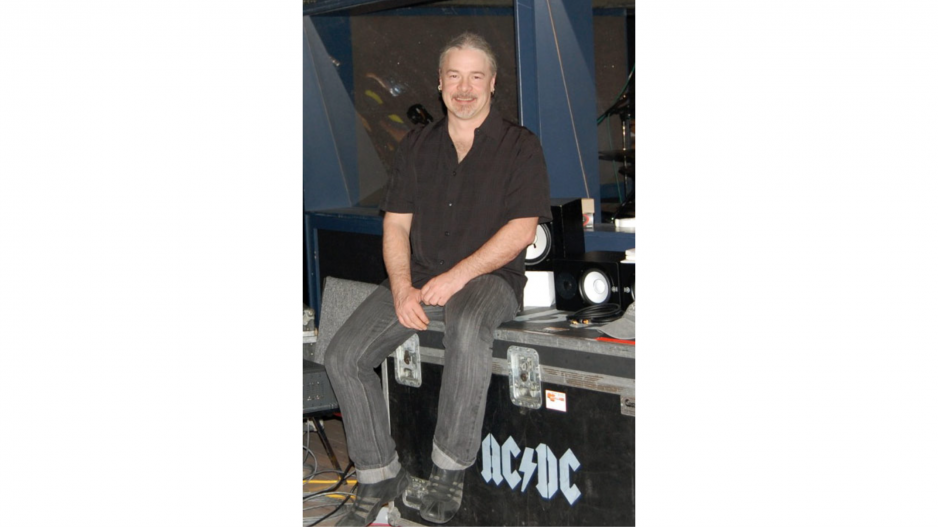The percussive booms emanating from a drummer’s kit are all just part of a rock song for most listeners.
Producer-engineer Mike Fraser doesn’t exactly listen to music the way most do.
“When I first started working at [Little Mountain Sound Studios] I think one of the biggest things you start learning is actually how to hear and how to listen. And part of that is blocking out everything that's not pertaining to what you're trying to listen to,” said Fraser, whose engineering credits include the just-released Power Up from AC/DC.
The B.C.-based music engineer often finds himself tuning his ears to just the vocals, or just the drums or just the guitars when a song starts playing.
“I could sit in a crowded room at a restaurant and listen to the conversation six tables away, because what you're doing is you're blocking everything else out and concentrating. In the studio, we call that putting it under the microscope,” Fraser said.
His latest collaboration with AC/DC, recorded at Bryan Adams’ The Warehouse Studio in Vancouver, nabbed the Australian hard-rockers their first-ever No. 1 album on Billboard.
But for Fraser, recording those blistering power chords, howling vocals and tight drums on Powell Street back in 2018 felt like a regular day on the job after a partnership with the rock legends stretching back to 1990’s The Razors Edge.
“I guess they just sort of enjoyed working with me over the years and I've sort of been their first-call guy anytime they've gone into the studio,” the Langley man remarked about the band’s past six albums.
“They're very down-to-Earth sort of blue collar guys. If you wouldn't have known their history and what they've done, they'd be just like normal people walking in there. So it's always a pleasure to work with them.”
AC/DC is known for intense live performances, and that doesn’t seem to let up any when recording albums.
“They like capturing the magic of their performances, so that's how we approached it in the studio. They come in and we spend some time getting all the sounds the way we want them and right. And then they go all together and sit out on the floor and play the song until it's got the excitement and the power that they are,” he said.
“Most of it's done live so we're recording the guitars and drums and bass all together, kind of in one take. One of the things you’ve got to kind of be mindful of is the separation. So you don't want the drums leaking into the guitar track or the guitar tracks leaking into the drum tracks.”
The band members have to be close enough to look each other in the eye while performing if they want to recreate the intensity of their live sound, which means a lot of long speaker cords connecting to cabinets in different rooms at the studio.
Despite the intricacies of the recording process, Fraser described his tutelage as coming from “the school of hard knocks.”
He quit high school in the late 1970s to work with his dad at their small logging company but eventually tired of getting laid off during the winter as cold, soggy weather hampered their work.
“I've always had a sort of a hankering for music and I knew I wasn't good enough of a guitar player to make any money at it so I thought, ‘Well, there's got to be a way to get into music,’” he recalled.
That’s when he began calling local studios in Vancouver and got his foot in the door working as a janitor at Little Mountain.
He eventually got to move from the mop to the control board after spending as much time as he could observing sound whizzes such as Roger Monk, who was mostly recording jingles at the time.
And before Bob Rock went on to produce records like Metallica’s The Black Album, the famed Vancouver figure was swinging by Little Mountain in the evenings to record local punk bands.
“So after working on the jingles one day I said to Bob, ‘Hey, would you mind if I came and hung out, helped you out at night?’” Fraser said.
“I started doing that. For about a year and a half, I lived at the studio in the loading bay in a sleeping bag, because I'd have to do my janitor stuff from five or six in the morning.”
Now a studio session begins with him sipping tea with producers like Brendan O’Brien (Bruce Springsteen, Pearl Jam, AC/DC) as they map out how to record the sounds ripping through the studio.
“This is the third record I've done with Brendan so we know each other pretty well, you know, he's a really good engineer in his own right. I know the first time we worked together and we had a bit of a discussion on my philosophy and his philosophy, he would just want to leave me to do my stuff. But if I didn't mind, he might jump in on the board and start twiddling,” Fraser said.
“And it's just totally fine because, you know, I've got no ego on it and it's all for the good of the project.”
After a 12-hour day engulfed in music, he prefers tuning to talk radio on his commute home to Langley.
Fraser likes to genre hop when he does listen to music but anything relying on Auto-Tune software makes him blanch.
“That's pretty exciting that we finally get rock music back in the No. 1 slot,” he said.
“I think we all needed it in this crazy year that's 2020.”




